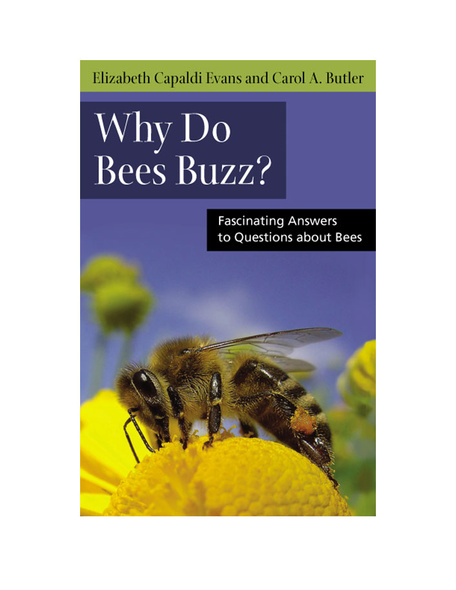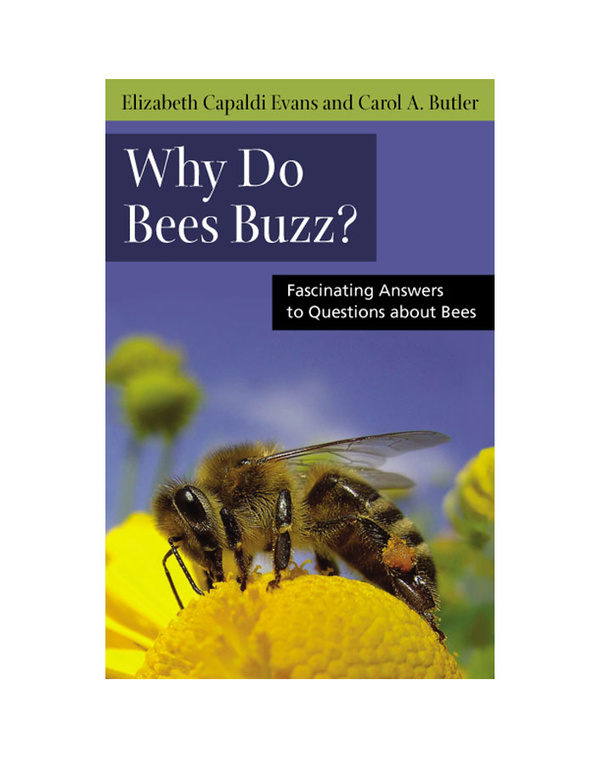
248 pages, 5 1/2 x 8 1/2
60 illustrations
Paperback
Release Date:09 Feb 2010
ISBN:9780813547213
Why Do Bees Buzz?
Fascinating Answers to Questions about Bees
By Elizabeth Evans and Carol A Butler
SERIES:
Animals Q & A
Rutgers University Press
Twenty-five thousand species of bees certainly create a loud buzz. Yet silence descended a few years ago when domesticated bee populations plummeted. Bees, in particular honey bees, are critical links in the vibrant chain that brings fruits, vegetables, and nuts to markets and dinner tables across the country. Farmers and scientists on the agricultural frontlines quickly realized the impact of this loss, but many others did not see this devastation.
Why Do Bees Buzz? reports on the mysterious "colony collapse disorder" that has affected honey bee populations, as well as other captivating topics, such as their complex, highly social lives, and how other species of bees are unique and different from honey bees. Organized in chapters that cover everything from these provocative pollinators' basic biology to the aggressive nature of killer bees, this insightful question and answer guide provides a honeycomb of compelling facts.
With clarity and depth, bee biologist Elizabeth Capaldi Evans and coauthor Carol A. Butler examine the lives of honey bees, as well as other species such as orchid bees, bumblebees, and stingless bees. Accessible to readers on every level, and including the latest research and theory for the more sophisticated reader, the authors reveal more than one hundred critical answers to questions about the lives of bees.
Concepts about speciation, evolutionary adaptation and pollination, as well as historical details about topics such as Mayan beekeeping and the appearance of bees in rock art, are arranged in easy-to-follow sidebars that highlight the text. Color and black and white photographs and drawings enhance the beauty and usefulness of Why Do Bees Buzz?
Why Do Bees Buzz? reports on the mysterious "colony collapse disorder" that has affected honey bee populations, as well as other captivating topics, such as their complex, highly social lives, and how other species of bees are unique and different from honey bees. Organized in chapters that cover everything from these provocative pollinators' basic biology to the aggressive nature of killer bees, this insightful question and answer guide provides a honeycomb of compelling facts.
With clarity and depth, bee biologist Elizabeth Capaldi Evans and coauthor Carol A. Butler examine the lives of honey bees, as well as other species such as orchid bees, bumblebees, and stingless bees. Accessible to readers on every level, and including the latest research and theory for the more sophisticated reader, the authors reveal more than one hundred critical answers to questions about the lives of bees.
Concepts about speciation, evolutionary adaptation and pollination, as well as historical details about topics such as Mayan beekeeping and the appearance of bees in rock art, are arranged in easy-to-follow sidebars that highlight the text. Color and black and white photographs and drawings enhance the beauty and usefulness of Why Do Bees Buzz?
Why Do Bees Buzz? not only has the potential to satisfy curiosity and entertain, but will also recruit enthusiastic new investigators to bee research. Even in a format intended for the general audience, Evans and Butler are able to convey the vigor of scientific research on bees in an intriguing manner.
Why Do Bees Buzz? provides updated and well-presented material about many questions the general public may have regarding bees. Evans and Butler precisely discuss the function of bees and why pollination is a vital part of the ecosystem, something of which all people should be aware.
Drawing on a vast and burgeoning literature on bees, this ambitious book is packed with interesting facts, both old and new.
Why do Bees Buzz? takes readers on a riveting journey through the life and times of these marvelous insects, while highlighting their economic and ecological importance. A thorough, engaging, and informative read.
This book is an interesting and authoritative read for the beekeeper-experiences or not. Why Do Bees Buzz serves the bee people of the world well. It's alluring style calls the uninitiated readers to keeping bees of their own. It is hard to put down.
This is a wonderfully engaging book that covers everything from the anatomy and physiology of bees to studies on their social structure. It is wide enough in scope and interest to make it a welcome addition to any library.
Intended for general audiences, the book draws heavily on scientific literature, giving readers a feel for the ongoing nature of scientific research; this is a real strength. Recommended.
Why Do Bees Buzz? is a wonderfully engaging book that covers everything from the anatomy and physiology of bees to studies on their social structure. Much of its appeal lies in its scope.
ELIZABETH CAPALDI EVANSis an associate professor of biology and animal behavior at Bucknell University in Lewisburg, Pennsylvania. Her studies have been published in a wide variety of scientific journals, including Nature, the Annual Review of Psychology, and the Journal of the Kansas Entomological Society.
CAROL A. BUTLERis the coauthor of Salt Marshes: A Natural and Unnatural History (Rutgers University Press), Do Butterflies Bite? Fascinating Answers to Questions about Butterflies and Moths, Do Bats Drink Blood? Fascinating Answers to Questions about Bats, and Do Hummingbirds Hum? Fascinating Answers to Questions about Hummingbirds.Preface
Acknowledgments
One. Bee Basics
Two. Bee Bodies
Three. Bee Behavior
Four. Bee Love
Five. Bees in the Hive
Six. Bees at Work
Seven. Honey
Eight. Bees on the Move
Nine. Bee Stings and Other Defenses
Ten. Dangers to Bees
Eleven. Beekeeping
Appendices
References
Index
Acknowledgments
One. Bee Basics
Two. Bee Bodies
Three. Bee Behavior
Four. Bee Love
Five. Bees in the Hive
Six. Bees at Work
Seven. Honey
Eight. Bees on the Move
Nine. Bee Stings and Other Defenses
Ten. Dangers to Bees
Eleven. Beekeeping
Appendices
References
Index




